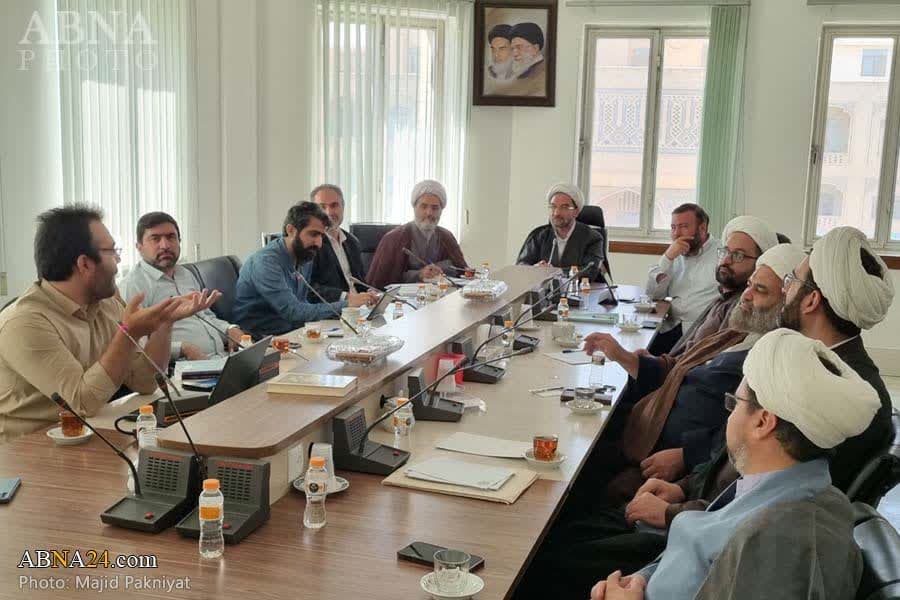- Main Page
- About the Conference
- Committees of Experts
- Organizers and Supporters
- News of the Conference
- Calls
- Calls for the Conference
- Call for Poetry Festival
- For Researchers
- About Hazrat Abu Talib (a.s.)
- Abu Talib’s Heritage
- Method of Writing Articles
- Multimedia
- Download posters and brochures
- Photo Gallery
- Download Special Issues
- Contact the Conference
- Address of the Secretariat
- Submit articles
Seminar “Expansion and Explanation of the Principles of Growth-Oriented Approximation” held by ABWA
The seminar “Expansion and Explanation of the Principles of Growth-Oriented Approximation; a Comparison with Other Theories, and Addressing the Challenges”, was held by the Department of Studies and Research of the AhlulBayt (a.s.) World Assembly in the conference hall of the Assembly in Qom.
ABWA Official Website – On Monday morning, October 7, 2024, the seminar “Expansion and Explanation of the Principles of Growth-Oriented Approximation; a Comparison with Other Theories, and Addressing the Challenges”, was held by the Department of Studies and Research of the AhlulBayt (a.s.) World Assembly in the conference hall of the Assembly in Qom.

In this seminar, Dr. Rasool Zarchini, a researcher and lecturer at the International University of Islamic Denominations, said, “Today, with active participation, we can reach the idea of approximation. The Islamic worldview is one of the foundations of the growth-oriented approximation philosophy among Muslims. Because all Muslims believe in the common God-seeking Fitrah, and human dignity based on servitude (of God).”
“Man lives with another, and man's identity is from another,” he added, “The more the approximation, the greater our responsibility. Approximation is a must for the realization of a felicitous life. Therefore, if we claim to be exclusive and superior in everything, we will not grow. Because the truth has been distributed among all humans.”
“Modern Islamic civilization, Imamate discourse, coexistence, networking for livelihood, and cross-cultural identification are approximation approaches. If, like Imam Musa Sadr, we serve Sunnis as well as other religions in a practical way, they will be attracted to us, and approximation will be realized,” the researcher added.
Further in the seminar, Dr. Mahdi Farmanian, Deputy for Scientific and Cultural Affairs of the AhlulBayt (a.s.) World Assembly, gave a lecture about the theory of “Growth-Oriented Approximation between Muslims.” “One of the advantages of this theory is its generality, and it seeks to include all the people. Because interacting with others makes us grow. But if we believe that the others’ theories are false and against Fitrah, how can we pave the way for our growth?”
“In the case of approximation, we argue that we have many commonalities with other denominations, which we should talk about, and in this discussion, we should discuss matters of appearance. Therefore, there is no room for exclusivism,” he added.
In another part of his speech, a full professor at the University of Religions and Islamic Denominations stated, “Figures like Sayed Jamaluddin Asadabadi, who crossed the borders, do not believe in exclusivism, and in my opinion, in the discussion of approximation, the theory and discourse of civilization is beyond all theories.”
**************
End/ 345
The seminar “Expansion and Explanation of the Principles of Growth-Oriented Approximation; a Comparison with Other Theories, and Addressing the Challenges”, was held by the Department of Studies and Research of the AhlulBayt (a.s.) World Assembly in the conference hall of the Assembly in Qom.
ABWA Official Website – On Monday morning, October 7, 2024, the seminar “Expansion and Explanation of the Principles of Growth-Oriented Approximation; a Comparison with Other Theories, and Addressing the Challenges”, was held by the Department of Studies and Research of the AhlulBayt (a.s.) World Assembly in the conference hall of the Assembly in Qom.

In this seminar, Dr. Rasool Zarchini, a researcher and lecturer at the International University of Islamic Denominations, said, “Today, with active participation, we can reach the idea of approximation. The Islamic worldview is one of the foundations of the growth-oriented approximation philosophy among Muslims. Because all Muslims believe in the common God-seeking Fitrah, and human dignity based on servitude (of God).”
“Man lives with another, and man's identity is from another,” he added, “The more the approximation, the greater our responsibility. Approximation is a must for the realization of a felicitous life. Therefore, if we claim to be exclusive and superior in everything, we will not grow. Because the truth has been distributed among all humans.”
“Modern Islamic civilization, Imamate discourse, coexistence, networking for livelihood, and cross-cultural identification are approximation approaches. If, like Imam Musa Sadr, we serve Sunnis as well as other religions in a practical way, they will be attracted to us, and approximation will be realized,” the researcher added.
Further in the seminar, Dr. Mahdi Farmanian, Deputy for Scientific and Cultural Affairs of the AhlulBayt (a.s.) World Assembly, gave a lecture about the theory of “Growth-Oriented Approximation between Muslims.” “One of the advantages of this theory is its generality, and it seeks to include all the people. Because interacting with others makes us grow. But if we believe that the others’ theories are false and against Fitrah, how can we pave the way for our growth?”
“In the case of approximation, we argue that we have many commonalities with other denominations, which we should talk about, and in this discussion, we should discuss matters of appearance. Therefore, there is no room for exclusivism,” he added.
In another part of his speech, a full professor at the University of Religions and Islamic Denominations stated, “Figures like Sayed Jamaluddin Asadabadi, who crossed the borders, do not believe in exclusivism, and in my opinion, in the discussion of approximation, the theory and discourse of civilization is beyond all theories.”
**************
End/ 345



